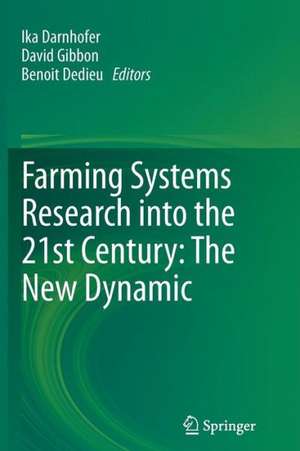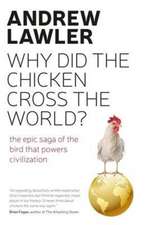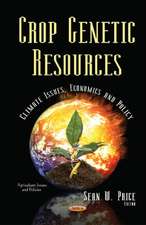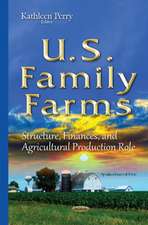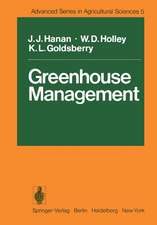Farming Systems Research into the 21st Century: The New Dynamic
Editat de Ika Darnhofer, David Gibbon, Benoît Dedieuen Limba Engleză Paperback – 11 iun 2014
| Toate formatele și edițiile | Preț | Express |
|---|---|---|
| Paperback (1) | 1226.73 lei 6-8 săpt. | |
| SPRINGER NETHERLANDS – 11 iun 2014 | 1226.73 lei 6-8 săpt. | |
| Hardback (1) | 1231.47 lei 6-8 săpt. | |
| SPRINGER NETHERLANDS – 7 iun 2012 | 1231.47 lei 6-8 săpt. |
Preț: 1226.73 lei
Preț vechi: 1496.01 lei
-18% Nou
Puncte Express: 1840
Preț estimativ în valută:
234.73€ • 245.74$ • 194.23£
234.73€ • 245.74$ • 194.23£
Carte tipărită la comandă
Livrare economică 05-19 aprilie
Preluare comenzi: 021 569.72.76
Specificații
ISBN-13: 9789401783576
ISBN-10: 9401783578
Pagini: 504
Ilustrații: XIV, 490 p.
Dimensiuni: 155 x 235 x 26 mm
Greutate: 0.7 kg
Ediția:2012
Editura: SPRINGER NETHERLANDS
Colecția Springer
Locul publicării:Dordrecht, Netherlands
ISBN-10: 9401783578
Pagini: 504
Ilustrații: XIV, 490 p.
Dimensiuni: 155 x 235 x 26 mm
Greutate: 0.7 kg
Ediția:2012
Editura: SPRINGER NETHERLANDS
Colecția Springer
Locul publicării:Dordrecht, Netherlands
Public țintă
Professional/practitionerCuprins
Part I: Farming Systems Research in Europe.- 1. Farming Systems Research: An approach to inquiry.- 2. The origins of the European IFSA: The first meetings and the agenda renewal.- 3. Early Farming Systems Research and extension experience in Africa and possible relevance for FSR in Europe.- 4. Textual analysis and scientometric mapping of the dynamic knowledge in and around the IFSA community.- 5. Methodological themes in Farming Systems Research and implications for learning in higher education.-Part II: State of the art and key issues.- 6. How should we farm? The ethical dimension of farming systems.- 7. Systems practice: Making the systems in Farming Systems Research effective.- 8. The role of action-oriented learning theories for change in agriculture and rural networks.- 9. Learning in European agricultural and rural networks: Building a systemic research agenda.- 10. Extension systems and change facilitation for agricultural and rural development.- 11. Agri-food system and territorial development: Innovations, new dynamics and changing governance mechanisms.- 12. The Territory Agronomy Approach in research, education, and training.- 13. Simulation models in farming systems research: Potential and challenges.- 14. Reshaping boundaries between farming systems and the environment.- Part III: Insights from system sciences and new perspectives.- 15. Dynamics in farming systems: of changes and choices.- 16. Farms and farmers facing change: The adaptive approach.- 17. Observing farming systems: Insights from social systems theory.- 18. Re-design and co-design of farming systems: An overview of methods and practices.- 19. Stimulating transitions towards sustainable farming systems.- 20. Evolution of systems approaches to agricultural innovation: Concepts, analysis and interventions.- Index.
Textul de pe ultima copertă
Farming Systems Research has three core characteristics: it builds on systems thinking, it depends on the close collaboration between social and biophysical sciences, and it relies on participation to build co-learning processes. Farming Systems Research posits that to contribute towards sustainable rural development, both interdisciplinary collaborations and local actor engagement are needed. Together, they allow for changes in understanding and changes in practices.
This book gives an overview of the insights generated in 20 years of Farming Systems Research. It retraces the emergence and development of Farming Systems Research in Europe, summarises the state-of-the-art for key areas, and provides an outlook on new explorations, especially those tackling the dynamic nature of farming systems and their interaction with the natural environment and the context of action.
We hope this book will serve as an inspiration for all those who seek an alternative approach to research in farming and rural development. One that builds on the reflexivity of researchers, one that takes the role of human subjectivities and perceptions seriously, one that gives voice to farmers, one that emphasises participation and co-learning processes, one that focuses on interactions between the elements, one that allows to capture interdependencies and their dynamics.
There is no doubt that Farming Systems Research has much to offer to answer the challenges faced by rural areas in the current turbulent and uncertain times. The book is thus aimed at practitioners, at graduate students and at researchers who seek new inspiration outside the mainstream, who take into account the ethical dimension of their work, and who seek encouragement to deepen their reflexivity about the meaning of professional practice and about their approach to research.
This book gives an overview of the insights generated in 20 years of Farming Systems Research. It retraces the emergence and development of Farming Systems Research in Europe, summarises the state-of-the-art for key areas, and provides an outlook on new explorations, especially those tackling the dynamic nature of farming systems and their interaction with the natural environment and the context of action.
We hope this book will serve as an inspiration for all those who seek an alternative approach to research in farming and rural development. One that builds on the reflexivity of researchers, one that takes the role of human subjectivities and perceptions seriously, one that gives voice to farmers, one that emphasises participation and co-learning processes, one that focuses on interactions between the elements, one that allows to capture interdependencies and their dynamics.
There is no doubt that Farming Systems Research has much to offer to answer the challenges faced by rural areas in the current turbulent and uncertain times. The book is thus aimed at practitioners, at graduate students and at researchers who seek new inspiration outside the mainstream, who take into account the ethical dimension of their work, and who seek encouragement to deepen their reflexivity about the meaning of professional practice and about their approach to research.
Caracteristici
A comprehensive overview of systems approaches as applied to farming and rural development Demonstrates the strengths of combining systems thinking, interdisciplinarity, and participation to achieve lasting change Over 60 cartoons that convey key messages at a glance
